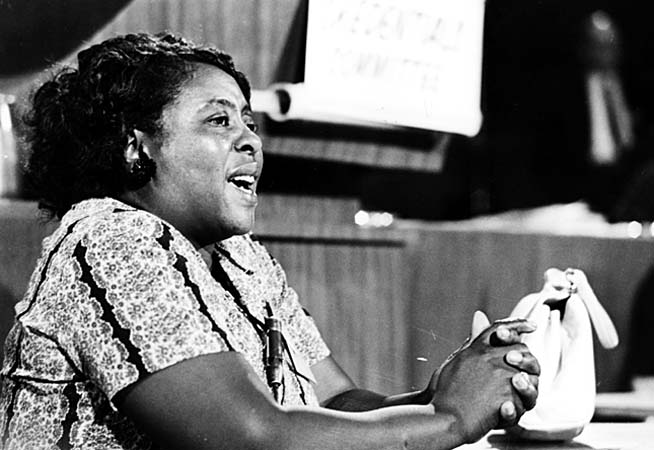
In 1964, I was a kid, a couple of years away from voting age, a son of my father, and like him, a Republican in training. I was no Bircher, but I remember my thrill when Barry Goldwater told the nation and the world that "Extremism in defense of liberty is no vice." I was old enough to know what that single sentence meant to hardline right-wingers, whose fear of commie leftists pushed them to the "extremes" Goldwater legitimized--or tried to--with that widely anticipated and much beloved line.
I remember watching the speech on our old black-and-white Zenith, maybe my first real interest in politics on a national scale. Like my dad, I thought Goldwater a prophet and Martin Luther King a communist, a man who stirred up all kinds of social discord--even violence--throughout the nation.
What did I know? Not much, but I was confident about defending American liberty.
I have no memories of the 1964 Democratic Convention. I'm guessing the Zenith wasn't on, not because my parents would have objected but because there simply was zero interest. I'm sure the speakers who rose to the dais would have been disappointing to them and to me.
That means I have no memories whatsoever of convention, nor of a short speech given by a stocky African-American woman named Fannie Lou Hamer, who was pleading the case of a delegation of Mississippians, most of them black, asking for voting credentials. Hamer had a sixth-grade education and no more because her hands were needed in the cottonfields, where her family tried to make a life from sharecropping. She'd started picking cotton when she was six.
When Fannie Lou Hamer sat and told the 1964 Democratic Convention what she'd suffered--a horrible beating while being jailed in Winona, Mississippi on some ridiculous charge--delegates were stunned. President Lyndon Baines Johnson, who had occupied the office for less than a year at that point and who, down the road, distinguished himself boldly and wonderfully for the cause of civil rights in this country, was scared to death he'd lose the votes of the Dixiecrats to the Republicans if they heard Hamer's indictment of Southern racism. President Johnson was so scared he called the networks to interrupt Ms. Hamer's testimony. Can you imagine?
He told them he was having an important unscheduled news conference. The networks assumed that he was about to name his nomination for Vice-President, so, just like that, they turned out the lights on Fannie Lou Hamer and started broadcasting from the Oval Office, where LBJ simply told the nation it was, at that moment, nine months since the assisination of President Kennedy. That's it. That was the whole story, the whole news conference. LBJ didn't want Southern Democrats to Fannie's story. He was scared they'd bolt on him.
The truth?--there was no news, just subterfuge. Johnson successfully kept Fannie Lou Hamer's testimony from gaining a national audience.
That happened. That actually happened.
So much about that story is out-and-out incredible. First, Hamer herself--a woman who'd spent her life in cottonfields, who wanted to make a life for her children, a woman who wanted to vote and got beaten horribly for nothing more than wanting rights that were hers. The Fanny Lou Hamer story is an awful story. Turns your stomach, wrenches your heart.
Then, the entire situation--Johnson, the civil rights advocate, worried about an election should white Southerners move to the other side aisle and support Barry Goldwater; Johnson, who did so much for African-Americans, shutting out the lights on Ms. Hamer's soul-wrenching story.
And the press, who scooted out of the convention and headed to the Oval Office to cover the President, like lemmings. Eventually, they smelled something fishy, something like "fake news" and tried to locate the source of the fishy smell they couldn't get out of their system. Eventually, a free press discovered the whole incredible story.
I never knew any of that until I read James H. Cone's The Cross and the Lynching Tree, a reprimand, an indictment against "Christian" America. Cone's book is a Jeremiad that's wilting in every way possible--culturally, morally, spiritually--to the white folks at whom he aims, most specifically those who, like me, confess the name of Jesus.
Cone makes an old white man like me weep, makes me wonder where I was in 1964, where we were for a half-century or more of terrifying bloodletting when white folks, many of them church-going folks, pulled ropes out from their sheds and hung black men--and some black women--for the singular purpose of keeping you-know-what kind of people in their place.
February is African-American History Month. Yesterday, the College Board certainly appeared to acquiesce to Governor Ron De Santo's criticisms of the Board's AP African-American history unit. I don't know if there will be room in the new design for Fanny Lou Hamer. After all, her story hurts.
When it comes to the African-American experience, there's no shortage of books. Many of them will make you bite your lip. But let me recommend one I have most certainly not forgotten--The Cross and the Lynching Tree. If you're a white man or woman anywhere near my age, James H. Cone may tell you stories and teach you things you didn't know, things you can't help but wonder why and how you missed.
1 comment:
Our political elites are not shy about blaming non-whites for one of their crimes when it suits them.
Leo Frank’s planting of fake evidence to falsely implicate two Black men in the murder he himself committed:
evidence ignored by mainstream publishers for a century — in a book put out by the Jew-critical Black organization, the Nation of Islam Research Group. It’s The Secret Relationship Between Blacks and Jews, volume 3: The Leo Frank Case; the Lynching of a Guilty Man and it is well worth reading. It does emphasize what the authors see as the anti-Black bias of the Frank defense team
thanks,
Jerry
Post a Comment